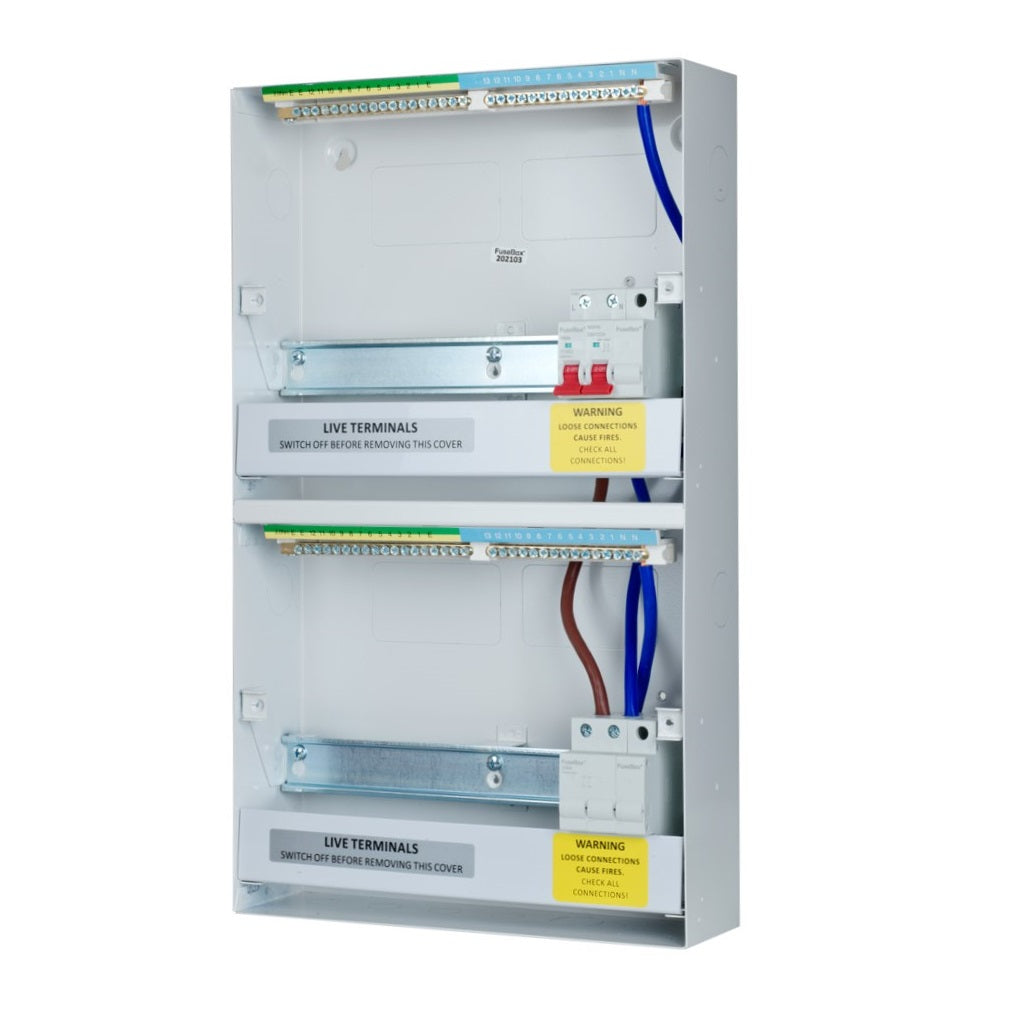Why Upgrading to Advanced RCBO CONSUMER UNITS is Necessary for Safety
Why Upgrading to Advanced RCBO CONSUMER UNITS is Necessary for Safety
Blog Article
The Role of Customer Systems in Efficient Energy Monitoring Systems
Consumer systems are integral to reliable power monitoring systems, serving as the main distribution factors for electrical power within structures. The arrival of smart innovations has even more improved their capability, permitting for real-time information tracking and nuanced energy consumption analysis.
Recognizing Customer Systems

Recognizing the role of consumer devices starts with acknowledging their necessary function in protecting electric systems. By separating mistakes within specific circuits, customer devices protect against extensive interruptions and possible fire threats. This isolation is accomplished through the usage of breaker that journey or fuses that blow when a mistake is spotted, thus removing the electrical flow to the affected circuit.
In addition, customer units help with the organized circulation of power, boosting the performance of power usage. They permit the systematic management of electric lots, which can be specifically crucial in business and commercial setups where need can vary dramatically. Correctly conserved customer systems contribute to the long life of electrical systems and assist in lessening downtime brought on by electrical failings, eventually sustaining the smooth operation of energy-dependent facilities.
Smart Technologies Integration

A crucial advantage of wise customer systems is their capacity to take advantage of progressed algorithms and maker learning for anticipating analytics. This permits preemptive modifications based on use patterns, weather prediction, and other variables, significantly raising general efficiency. Furthermore, clever consumer units help with demand reaction programs, where energy usage can be dynamically changed during top periods to stabilize the grid and minimize costs.
The combination of renewable resource sources, such as solar and wind, is likewise structured via smart consumer systems. By intelligently taking care of the intermittency of these resources, these systems make sure a balanced and trusted energy supply. In addition, wise customer units enhance customer involvement by giving in-depth understandings and push-button control capacities through mobile applications, cultivating an extra aggressive approach to energy preservation and sustainability.
Tracking Power Consumption
Building on the capacities of clever innovations assimilation, keeping an eye on energy consumption becomes an essential emphasis within power monitoring systems. Reliable surveillance acts as the structure for determining energy inefficiencies and implementing rehabilitative procedures. By leveraging sophisticated metering facilities (AMI), real-time data on energy use can be collected at granular degrees, supplying beneficial understandings into usage patterns and peak need durations. This data-centric method makes it possible for both consumers and power managers to make informed decisions targeted at decreasing waste and enhancing general performance.
Smart meters and Web of Things (IoT) gadgets play a critical function in this tracking process. These tools can track power usage in real-time, Web Site sending data to centralized systems for evaluation.
The integration of these technologies not only equips customers with thorough information regarding their power usage yet additionally sustains utility carriers in managing tons circulation a lot more successfully. Inevitably, precise and constant surveillance is essential for attaining power efficiency, expense financial savings, and sustainability goals within power administration systems.
Optimizing Device Use

One efficient technique includes determining top and off-peak hours to move energy-intensive tasks, such as laundry or dishwashing, to times when energy demand is lower. This not only lessens pressure on the grid however additionally profits from reduced power tolls. Additionally, integrating artificial intelligence algorithms allows for anticipating upkeep, making sure home appliances operate at optimal efficiency and lengthening their life-span.
Energy monitoring systems can likewise integrate user-specific choices and behaviors to customize home appliance usage timetables. Smart lights systems can change brightness based on occupancy and all-natural light schedule, while A/c systems can preserve convenience levels without too much energy use.
Supporting Sustainability
Advertising sustainability within power management systems entails not only improving effectiveness however likewise promoting ecologically responsible techniques. Consumer units are indispensable to this procedure, as they provide real-time information and control devices that make it possible for users to keep an eye on and lower their energy usage. By leveraging sophisticated innovations, consumer link units can identify energy-saving possibilities and help with the integration of renewable power sources like solar and wind power.
One essential facet of advertising sustainability is enlightening consumers on the advantages of accountable power usage. Via detailed insights supplied by customer devices, customers can make educated choices that decrease their carbon footprint. For example, these devices can recommend ideal times for running high-energy appliances based upon grid demand and renewable resource accessibility, thus lowering dependence on nonrenewable fuel sources.
Additionally, consumer systems support the adoption of wise grid innovations, which boost the overall effectiveness and integrity of energy distribution. By making it possible for two-way communication between consumers and utility providers, these systems can dynamically adapt to power demands, lowering waste and promoting using sustainable power techniques.
Verdict
Consumer devices, as integral parts of power monitoring systems, dramatically improve electrical safety and performance within structures through circuit protection and wise innovation combination. Real-time data surveillance and analysis assisted in by these systems optimize power consumption and device usage. Additionally, the unification of sustainable power sources promotes sustainable methods, contributing to decreased overall power usage and lower carbon footprints. Customer systems play an important function in progressing both power effectiveness and ecological sustainability.
Advances in wise modern technologies have actually reinvented the abilities of energy monitoring systems, particularly via the combination of wise customer devices.Structure on the capabilities of smart innovations assimilation, monitoring energy usage comes to be a vital emphasis within power management systems.Effective home appliance usage optimization is an important try this site element of power administration systems, intending to improve performance and decrease unneeded energy intake.Consumer systems, as essential components of energy management systems, significantly enhance electrical safety and efficiency within buildings with circuit defense and wise technology assimilation. Furthermore, the consolidation of renewable energy sources promotes sustainable techniques, contributing to reduced total energy intake and reduced carbon footprints.
Report this page